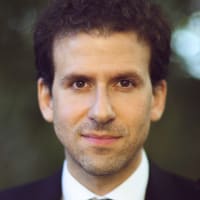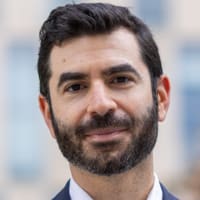Chopin Sonata in G minor, Op. 65
Chopin composed almost exclusively for the piano and yet the last work published in his lifetime is the cello sonata he composed for his longtime friend and colleague Auguste Franchome. Often thought of as an entirely intuitive composer and improviser who wrote from his unconscious, Chopin was in fact a perfectionist who thought through every phrase and was deeply concerned with craft. By focusing on the brief slow movement of this sonata, we will come to understand the exquisite detail of his compositional thinking.
Chopin's Nocturne in E-flat major for Piano, Op. 9, No. 2 (1830-32) and Sonata in G minor for Cello and Piano, Op. 65 (1845-46) performed by Nicholas Canellakis, cello and Michael Stephen Brown, piano.
Recorded in the Daniel and Joanna S. Rose Studio. Originally aired on November 17, 2021.
| Title | Date |
|---|---|
| Streaming live | {{ViewModel.StreamingOn.date}}, {{ViewModel.StreamingOn.time}} |
| Available on-demand until | {{ViewModel.AvailableUntil.date}}, {{ViewModel.AvailableUntil.time}} |
{{ViewModel.BuySubscription.prompt}}

Bruce Adolphe

Nicholas Canellakis

Michael Stephen Brown

Resident lecturer and director of family concerts for CMS since 1992, Bruce Adolphe is a composer of international renown, much of whose output addresses science, history, and the struggle for human rights.
Resident lecturer and director of family concerts for the Chamber Music Society of Lincoln Center since 1992, Bruce Adolphe is a composer of international renown, much of whose output addresses science, history, and the struggle for human rights. His works are frequently performed by major artists, including Itzhak Perlman, Yo-Yo Ma, Fabio Luisi, Joshua Bell, Daniel Hope, Angel Blue, the Brentano String Quartet, the Washington National Opera, the Metropolitan Opera Guild, the Human Rights Orchestra of Europe, and over 60 orchestras worldwide. Among his most performed works are the violin concerto I Will Not Remain Silent, the violin/piano duo Einstein’s Light, and Tyrannosaurus Sue: A Cretaceous Concerto.

Nicholas Canellakis has become one of the most sought-after and innovative cellists of his generation, praised as a “superb young soloist” (New Yorker) and for being “impassioned . . . the audience seduced by Mr. Canellakis's rich, alluring tone” (New York Times). A multifaceted artist, Canellakis has forged a unique voice combining his talents as soloist, chamber musician, curator, filmmaker, and composer/arranger. His recent highlights include solo debuts with the Virginia, Albany, Bangor, Stamford, and Delaware symphony orchestras; concerto appearances with the Erie Philharmonic, the New Haven Symphony as artist-in-residence, and the American Symphony Orchestra in Carnegie Hall; Europe and Asia tours with the Chamber Music Society of Lincoln Center; and recitals throughout the United States with his longtime duo collaborator, pianist-composer Michael Stephen Brown. An alum of CMS’s Bowers Program, Canellakis is a regular guest artist at many of the world’s leading music festivals, including Santa Fe, Ravinia, Music@Menlo, Bard, Bridgehampton, La Jolla, Hong Kong, Moab, Music in the Vineyards, and Saratoga Springs. He is the Artistic Director of Chamber Music Sedona in Arizona and is a graduate of the Curtis Institute of Music and New England Conservatory. Filmmaking and acting are special interests of his; he has produced, directed, and starred in several short films and music videos. Canellakis plays on an outstanding Jean-Baptiste Vuillaume cello, circa 1840.

Michael Stephen Brown has been described as “one of the leading figures in the current renaissance of performer-composers” (New York Times). Winner of a 2018 Emerging Artist Award from Lincoln Center and a 2015 Avery Fisher Career Grant, he is an artist of the Chamber Music Society of Lincoln Center and an alum of CMS’s Bowers Program. He makes regular appearances with orchestras such as the National Philharmonic and the Seattle, Phoenix, North Carolina, and Albany symphonies, and recently has made European recital debuts at the Beethoven-Haus Bonn and the Chopin Museum in Mallorca. He has received commissions from many organizations and some of today’s leading artists, and recently toured his own Piano Concerto around the US and Poland with several orchestras. He performs regularly with his longtime duo partner, cellist Nicholas Canellakis, and has appeared at festivals worldwide. A prolific recording artist, he has three albums in the works, including Mendelssohn+, featuring world premieres of music by one of Mendelssohn’s muses, Delphine von Schauroth. He was the composer- and artist-in-residence at the New Haven Symphony, and winner of the Concert Artists Guild and Copland House Awards. He holds degrees in piano and composition from the Juilliard School, where he studied with Jerome Lowenthal, Robert McDonald, and Samuel Adler. Additional mentors include András Schiff and Richard Goode. An Artist Ambassador for Creatives Care, Brown lives in New York City with his two 19th-century Steinway D pianos, Octavia and Daria.
